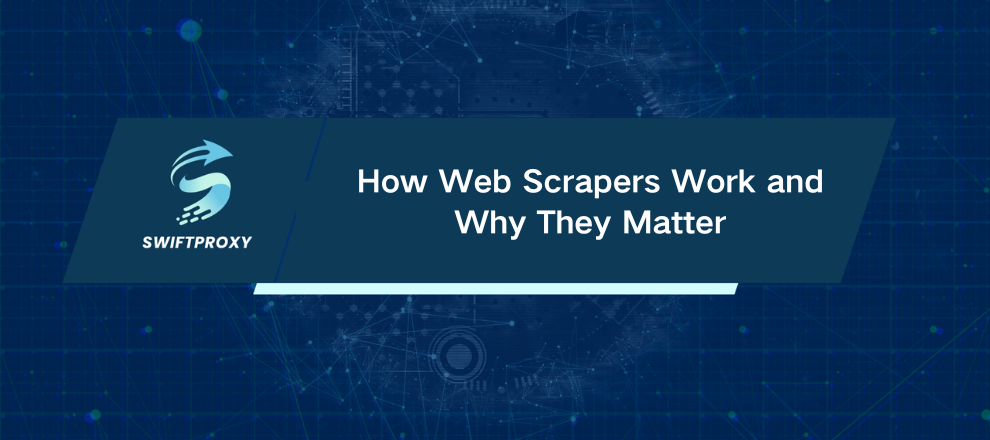How Web Scrapers Work and Why They Matter
Web scraping isn’t just a tech buzzword—it’s a business superpower. Companies that leverage it effectively can pull millions of data points from the web in hours—something a human team would take months to achieve. Imagine tracking thousands of competitor prices, monitoring customer sentiment, or spotting trends before anyone else. That’s the kind of edge web scrapers provide. This article explains what web scrapers are, their business advantages, and the legal rules you need to follow. You’ll also get practical tips for using them responsibly and learn how to safely and efficiently integrate web scraping into your data strategy.

The Overview of Web Scrapers
Definition
At their core, web scrapers are programs that automatically extract structured data from websites. Think of them as digital harvesters, turning raw web content into usable information.
Core Components
Downloader: Fetches HTML or rendered pages.
Parser: Converts messy HTML into structured, usable data.
Data Transformer: Cleans, formats, and standardizes the information.
Storage Unit: Saves data to databases, spreadsheets, or cloud storage.
Types of Web Scrapers
Pre-built Scrapers: Minimal setup, often cloud-based tools.
Custom Scrapers: Scripts built with frameworks like BeautifulSoup, Scrapy, or Puppeteer.
API-based Tools: Visual platforms with automation and integrations.
The right choice depends on your technical skill, the complexity of your data needs, and your scalability goals.
Key Advantages of Using Web Scrapers
Data Collection at Scale
Web scrapers excel at harvesting large volumes of data quickly. Manual collection? Forget it—it's slow and error-prone. With automation, you can:
Monitor thousands of competitor prices in real time.
Pull hotel and flight rates continuously for travel platforms.
Analyze product reviews across major e-commerce sites in minutes.
Web scraping transforms a tedious, impossible task into a manageable, repeatable process.
Real-Time and Repeatable Updates
Data is only valuable if it's fresh. Web scrapers can be scheduled to run automatically, giving you real-time insights. Examples:
Retailers can adjust pricing dynamically based on competitors.
Financial analysts get up-to-the-minute stock or commodity data.
SEO teams track SERP rankings and online mentions instantly.
Without scraping, keeping pace with changing web data is nearly impossible at scale.
Competitive Analysis
Want to know exactly what your competitors are doing? Scrapers can help you:
Track pricing, stock, and promotions.
Analyze product assortments and descriptions.
Assess customer reviews and sentiment for market intelligence.
This insight allows businesses to refine offerings, identify market gaps, and stay ahead—all without exhausting manual research.
Is Web Scraping Allowed
Understanding Legal Boundaries
Scraping isn't illegal by default. But context matters:
Legal scraping: Collecting publicly available data responsibly.
Illegal scraping: Violating terms of service, privacy laws, or intellectual property.
Legality often depends on the data source, usage, and jurisdiction.
Terms of Service and Robots.txt
Most sites have Terms of Service (ToS) specifying what's allowed. Ignoring these can risk IP bans, reputational damage, or even legal trouble. Robots.txt files indicate preferred crawling rules—not legally binding, but respecting them keeps your operations smooth.
Privacy Considerations
If data can identify individuals—directly or indirectly—it counts as personal data. Compliance requires:
Clear purpose for data use.
User notice or consent where applicable.
Secure storage and processing.
Failing to follow privacy rules can result in fines or lawsuits.
Best Practices for Compliance
Scrape only publicly accessible data.
Respect ToS and robots.txt.
Throttle requests to prevent server strain.
Log activities transparently.
Avoid reselling personal data.
Following these practices ensures you get value without legal or ethical risk.
How to Leverage Web Scrapers Effectively
Define your objective. Know exactly what data you need and where to find it.
Choose the right tool. Simple tasks? Open-source scrapers work. Complex needs? Cloud platforms are faster and scalable.
Use proxies. Rotating IPs prevent bans and ensure smooth extraction.
Automate scheduling. Keep your data current without manual effort.
Clean and structure data. Remove duplicates, fix missing values, and save in secure formats like CSV or databases.
Follow legal and ethical guidelines. Compliance protects both your brand and your bottom line.
Done right, web scraping saves time, reduces errors, and delivers insights that drive decisions.
Conclusion
Web scrapers are game-changers for data-driven businesses. They provide scalable collection, real-time updates, competitive intelligence, and much more. But their value comes with responsibility.
Ethical use and legal compliance aren't optional. Respect site policies, throttle requests, secure data, and log activity. When done right, web scraping turns raw web content into actionable intelligence—fast, efficiently, and safely.

















































